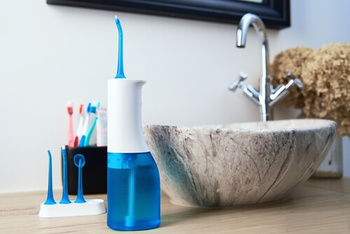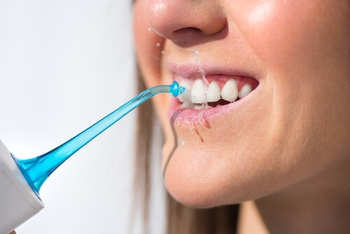Let’s face it: flossing with string can be a real pain. Ever get that floss stuck between your teeth and feel like you’re about to yank out a whole chunk? Traditional string floss works, but there’s a new sheriff in town: the water flosser! These nifty gadgets use water pressure to clean between your teeth, and a common question pops up: can water flosser damage gums?
Worry not, mate! We’re about to dive into the wonderful world of water flossers, debunk the myth of gum damage, explore all the benefits, and show you how to use them for the healthiest gums ever.
Benefits Of Water Flossers: Power Up Your Gum Game
Water flossers, or oral irrigators, are like tiny power washers for your mouth. They use a jet stream of water to blast away food bits and plaque hiding between your teeth and along your gum line. Pretty cool, right? Here’s how these little champions can help your smile shine:
Improve Gum Health

Plaque and tartar buildup can irritate your gums and lead to gingivitis, but don’t worry—water flossers can be your secret weapon. Studies have shown they’re super effective at removing plaque and food debris, which helps keep your gums happy and healthy.
Reach All The Hidden Nooks And Crannies
Unlike traditional floss, which can sometimes struggle to reach tight spots, water flossers can easily navigate those tricky areas. Think of them like tiny ninjas of clean, reaching between teeth, around braces, and even cleaning under implants. No food debris escapes their wrath!
Gentler On Those Sensitive Gums
Traditional floss might feel like torture if you have sensitive gums or teeth. Water flossers offer a much gentler approach, letting you clean your teeth without the ouch factor.
Water Flossers Vs. Traditional Floss: The Showdown
So, water flossers versus traditional floss—who wins? Well, both methods are champs at removing plaque and food debris, but water flossers might have a slight edge in a few areas:
- Easier To Use: Let’s be honest, traditional floss can be a bit fiddly to use, especially if you have limited dexterity. Water flossers are generally much easier to handle and navigate around your mouth.
- Deeper Clean: The pressurised water stream in a water flosser can reach areas that traditional floss might miss, giving you a more thorough clean all around.
- Sensitive Gum Saviour: For those with sensitive gums, water flossers offer a much more comfortable flossing experience.
Mastering The Water Flossing Technique: Become A Gum Cleaning Guru
To get the most out of your water flosser and keep your gums happy, here are a few pro tips for mastering the technique:
Start Low And Slow
Don’t blast your gums with the highest pressure setting straight away. Begin with the lowest setting and then raise it as your gums adapt to the sensation. Think of it as training your gums for a marathon, not a sprint.
Aim At The Gum Line
Imagine your water flosser tip is a tiny firefighter’s hose. Point it at the angle where your tooth meets your gum (the gum line) and gently glide it along the space between each tooth.
Take Your Time, Grasshopper
Rushing through your water-flossing routine won’t do much good. Take your time, ensuring you reach all the areas between your teeth and your gum line.
Warm Water Is Your Friend
For a more comfortable experience, use warm water in your water flosser. Think of it as a mini spa treatment for your gums!
Lean Over The Sink, Not The Mirror
Avoid aiming the water flosser directly into your mouth to prevent a geyser situation. Lean over the sink while you floss to keep things tidy.
Bleeding Gums? Don’t Panic—It’s A Sign Of Progress!
If you see a little blood when you first start using a water flosser, don’t freak out; it’s not a sign of gum disease. This can sometimes happen if your gum tissue is inflamed due to plaque buildup.
Stick with your water flossing routine using the proper technique, and within a few weeks, the bleeding should subside as your gum health improves. However, if the bleeding continues, it’s always best to consult your dental expert to rule out any underlying gum issues.
Frequently Asked Questions
Can water flossers hurt my gums?
Nope, not if you use them correctly with the right pressure setting and technique. In fact, they can be a lifesaver for your gums by effectively removing plaque and food debris that can irritate them.
Are water flossers as good as traditional floss?
Water flossers can be just as beneficial as traditional flossers in removing plaque and keeping gums happy, especially for those who find traditional flossing a challenge.
Which water flosser should I get?
There are many water flossers on the market, each with its own features. Look for features like adjustable pressure settings, ease of use, and a decent warranty. Chatting with your dentist about which water flosser might be best for you is always a good idea.
Can I use hot water in my water flosser?
Definitely not! Stick with warm water to avoid burning your gums.
How often should I use a water flosser?
We recommend using a water flosser once a day, ideally before brushing.
Is water flossing a replacement for brushing?
No way! Brushing is essential if you want to remove food particles and plaque from your teeth. Water flossing is a fantastic addition to your routine but can’t replace brushing altogether.
I have dental implants. Can I use a water flosser?
Water flossers can be a great way to clean around dental implants but consult your dentist first to ensure you’re using the proper technique and flossing tip to avoid damaging the implant.
Water Flossing For A Sparkling Smile (And Healthy Gums!)

Water flossers are a fantastic way to take your oral hygiene routine to the next level. They offer a safe and effective way to remove plaque and food particles, keeping your gums healthy and your breath fresh. With proper technique and pressure setting, water flossers can be a game-changer for your smile.
So, ditch the floss-related frustration and give water flossing a go! Remember, a healthy, beautiful smile begins with a clean mouth, and water flossers can be a powerful tool to achieve that sparkling smile (and healthy gums!) you deserve.
Contact your trusted dental clinic in Winston Hills NSW 2153, at (02) 9159 6237 to restore your beautiful smile and oral health.
Sources:
“Bleeding Gums: Tips on How to Treat and Prevent Future Bleeding.” Byte, 28 Dec. 2022, www.byte.com/community/resources/article/bleeding-gums-tips-on-how-to-treat-prevent.
Lin, Steven, DDS. “Is Water Flossing Better Than String Flossing?” Verywell Health, 5 Mar. 2023, www.verywellhealth.com/is-water-flossing-better-than-string-flossing-4137725.
Rdh, Whitney DiFoggio Ma. “How to Use a Water Flosser (Without Making a Mess).” Teeth Talk Girl, 5 Dec. 2023, www.teethtalkgirl.com/dental-health/how-to-use-water-flosser.“What Is a Water Flosser and Its Benefits?” Oral-B, oralb.com/en-us/oral-health/why-oral-b/floss/what-is-water-flosser-benefits.

